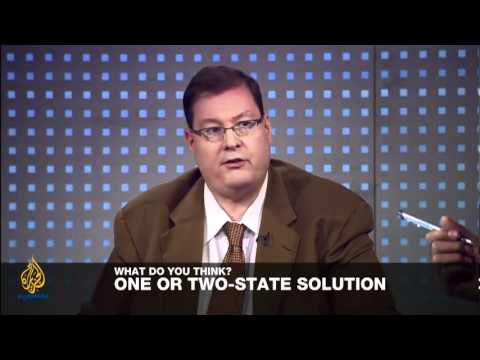 This past Thursday afternoon, Professor David Myers — chair of UCLA’s Department of History and scholar of modern Jewish intellectual history — hosted an informal discussion with Dr. Hussein Ibish, bringing together a diverse group of graduate and undergraduate students to exchange ideas on the state of the Israeli-Palestinian conflict following the recent Israeli elections.
This past Thursday afternoon, Professor David Myers — chair of UCLA’s Department of History and scholar of modern Jewish intellectual history — hosted an informal discussion with Dr. Hussein Ibish, bringing together a diverse group of graduate and undergraduate students to exchange ideas on the state of the Israeli-Palestinian conflict following the recent Israeli elections.
Dr. Ibish serves as a Senior Fellow at the American Task Force on Palestine and Executive Director of the Hala Salaam Maksoud Foundation for Arab-American Leadership. A prominent lecturer and commentator on issues relating to the viability of the two-state solution, Dr. Ibish delivered a fresh and cogent assessment of the stalemate that persists between Israel and the Palestinian Authority following the pyrrhic re-election of Prime Minister Bibi Netanyahu.
According to Ibish, Israeli voters rewarded politicians who campaigned on social issues, such as the centrist Yesh Atid party, whose first foray into Israeli politics gained it a whopping 19 seats, and the center-left Labour Party, which won 15 seats — a seven-seat jump from its previous standing.
Conversely, Israeli voters punished parties that campaigned on national security issues, such as the Iranian nuclear issue and rights for Jewish settlers in the West Bank. These parties include the Netanyahu-Lieberman dominated Likud-Beiteinu list and Naftali Bennett’s Jewish Home party. These and other parties in the right-wing bloc, which represent a commitment to the status quo on the stagnant peace process with the Palestinians, are expected to form a coalition of 65 members of Knesset — a 19 MK drop since the 2009 elections. The Israeli people, Ibish asserted, are growing increasingly dissatisfied with Netanyahu’s refusal to make any progress on resolving the conflict with the Palestinians.
On the Palestinian front, Ibish identified a discouraging lack of progress. All accomplishments made by the Abbas-led PLO in the past few years have been symbolic, including the UN General Assembly’s recognition of the State of Palestine and the labeling of the Church of the Nativity in Bethlehem as a UNESCO World Heritage Site in Palestine. These victories, while celebrated by Palestinians across the world, have done nothing to ease Israel’s control over the West Bank and Gaza or provide a fulfillment of the right of return for Palestinian refugees throughout the Middle East. So devoid of substance is the current Palestinian national movement, Ibish joked, that the greatest controversy among West Bank Palestinians is how Arafat, whom we all saw wither away from disease on national television, was murdered.
In order to push the peace process forward, Ibish put the ball in the Palestinians’ court. He urged that Palestinians must make the Israeli population feel the problem of the occupation once again. However, this cannot be accomplished through violence, as it was during the first and second intifadas. Palestinians must confront the Israeli occupation by forming a completely non-violent uprising. And it cannot simply be called “nonviolent,” it must indisputably live up to the label. Ibish predicted that when Palestinians can march from Ramallah to Jerusalem and accept that they might be killed on the way, and when they internalize the reality that rock-throwing ruins their cause, Israel will have no way to avoid the trap of such political jiu jitsu.
Ibish further argued for a restructuring of the definition of martyrdom among Palestinians. Instead of memorializing individuals who sacrifice their lives in armed struggle against the occupation, they should celebrate the people who die upholding the movement’s commitment to nonviolence.
A few people in the audience found Ibish’s remarks to come off as too similar to what an apologist for Israel’s actions might say. Gabriel Piterberg — a scholar of Ottoman history at UCLA who was raised in Israel — reminded Ibish and the rest of the group that we are speaking of an imbalanced conflict, and any recommendation we give to the Palestinians must be uttered only with the recognition that the relationship between the Israelis and the Palestinians is one between the colonizer and the colonized. It is because Israel holds all of the cards in this conflict that the Palestinians have been so unsuccessful at choosing a method of resistance that ends the conflict peacefully.
This was not Ibish’s first time sharing his thoughts on the Israeli-Palestinian conflict at UCLA. Last Spring Quarter, Ibish championed the viability of the two-state solution in a debate with theologian Reza Aslan in an event hosted by the Olive Tree Initiative at UCLA. Many members of that group were also present at the discussion hosted by Professor Myers.
Despite his grim diagnosis, Ibish remained firmly committed to advocating for the two-state solution, which he sees as the only resolution that can be conflict-ending and peaceful. However, he pointed out that not all conflicts have the fortune of being resolved. We often forget that many of the world’s conflicts go away only because the world system evolves, the context changes, and the stakes for which the parties originally fought become irrelevant. This may very well be how the Israeli-Palestinians conflict gets laid to rest in the coming decades.

